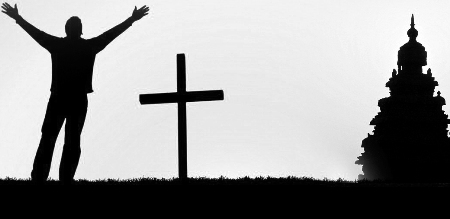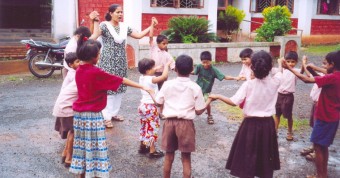The Push To Bring Goan Christians “Back” To Hinduism
Response: “Thank You, But No Thank You”
For the uninitiated, let me break down for you the world we currently live in.
It’s a world in which a BJP Member of Parliament asks Hindu men to exhume the dead bodies of Muslim women and sexually defile them. Another MP asks all Indians to boycott the “big three” of Indian cinema – Salman Khan, Shah Rukh Khan and Aamir Khan – because they’re in relationships Hindu women. It’s a world in which simple possession of beef in neighbouring Maharashtra would get you five years in jail, and where a deeply valuable documentary illuminating societal ills behind rape is banned by the government.
In this environment, the latest salvo from the Goan chapter of the VHP (Vishwa Hindu Parishad or World Hindu Council) inviting local Catholics to “return to the fold” of Hinduism should not come as a surprise. The “Ghar Wapsi,” or homecoming campaign, would facilitate the return of Christians who were forcibly converted during Portuguese rule.
“Thousands of Hindus were converted to Christianity by the Portuguese. If they want to come back and contact VHP, we will welcome them with prem (love), respect, mamta (affection) and equality (samata),” said Dada Vedak, a senior functionary with the local VHP.
While Vedak was quick to add these “reconversions” will be voluntary, their very mention reflects the generalized atmosphere of growing Hindu intolerance not just in India as a whole, but in Goa as well. Whether the Portuguese had a right to conquer South Asian territories and convert the locals (they didn’t), is beside the point. That’s because history cannot be relived, and past conquests are part of ground realities throughout the world. Black Americans are mostly Christian, even though their ancestors were brutally separated from the tribal religions of Africa by slave traders. Christian boys in the Ottoman Empire were seized, converted to Islam and enlisted in an elite military unit at the service of the sultan. Millions of people throughout India have ancestors of a different religion because of forced conversions.
Here in Goa, it is true the Portuguese engaged in religious persecution, including torture, forced conversion, the destruction of Hindu temples and the prohibition of Hindu rituals. But it’s also true that Goa’s Indo-Portuguese heritage has given it a unique identity that is beloved and appreciated by people all over the world. The Portuguese conquest, lasting 451 years, was often brutal, but it also freed many locals from the tyranny of caste.
Bottom line: It is what it is.
In a state that loves a good tenderloin steak as much as it does a gathering around a village cross to say the rosary and share a drink into the evening, an announcement like the VHP’s makes more than a few uncomfortable.
“It was my ancestors who were converted. I was born into Christianity. How can this be considered a re-conversion? This is a conversion just as converting a Hindu to any other religion would be,” said Paula de Souza, a working professional.
Social anthropologist Jason Keith Fernandes argues that the original conversions to Christianity were often a kind of emancipation.
“The story of forced conversions is being raised with annoying frequency. When in fact, the story of the Christianisation is a story of the liberation of oppressed castes from the cruelty of their upper-caste owners,” he said, contending that a large part of the Goan population embraced Christianity and that it was mostly the dominant upper castes who had a problem with it.
“If these upper-caste tyrants were forced to flee (in the 16th and 17th centuries) because they refused to brook this new situation of freedom then we need have no sympathy for them at all,” he added.
In his book ‘Being a Goan Christian’, Fr Victor Ferrão has pointed out that the “contemporary Christian in Goa is seen as an agent of the Portuguese and made responsible for the deeds of the early modern Portuguese in Asia, as well as the Christian missionaries of the time.”
“The rhetoric of the Hindu Right, and that of their Ghar Wapsi project, rests on the suggestion that pre-modern South Asia was a society of free individuals. The fact is that it was not, it was a land of widespread servitude and slavery. Colonial rule and Christianity came as a welcome relief to many of the people who converted,” Fernandes adds.
In his defence of Ghar Wapsi, Vedak pointed out that missionary work – the conversion of others – has long been an integral part of Christianity.
“We will not force anyone the way the Catholic Church has been doing aggressively. If they want to come (into Hinduism) how can we stop them?” Vedak said.
Indeed, the “you-are-doing-it-so-can-we-too” defence seems to be the biggest rallying cry of those supporting the VHP initiative. They argue that the uproar emerges only when Hindus attempt it and not when it’s done by Christian missionaries, including all the Protestant groups out there enticing “vulnerable” persons into their band of worshipers.
Avelino de Sa, an accountant and social activist, argued that what’s important is a person’s character, not the church or temple they attend.
“Why fear Ghar Wapsi?” he said. “Is it better to have a few Christians on fire for Jesus than to have lakhs of lukewarm Christians?”
“There are many non Christians who are practising Jesus’s teachings of love and forgiveness more than many Christians. They have not changed their religion. That is important,” he added in comments that were much appreciated online.
It’s important to note that in recent weeks, just before the Panjim by-elections, former Goa Chief Minister and current Union Defence Minister Manohar Parrikar promised a delegation of Panjim Catholics that the Ghar Wapsi would not be allowed in Goa.
Apparently, the local chapter of the World Hindu Council has yet to receive notice of that assurance.




